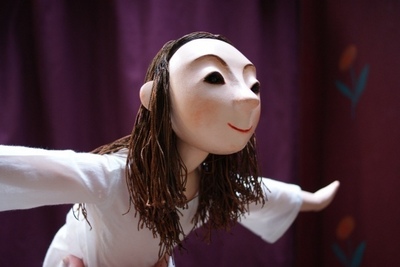The Magician’s Daughter, Little Angel Theatre
reviewed for The Spectator, 15 January 2011

Theatre, like all the best addictions, is a habit for life. The sad facts of class and social immobility mean that that you’re far more likely to become a regular theatregoer as an adult if you were taken to the theatre often as a child, but it’s not because theatre is merely a social pursuit favoured by the upper-middle class, or even that theatre need be economically exclusive compared to other entertainments. (I challenge any reader to find a theatre in London where every seat is more expensive than a Premier League football ticket.) Thanks to the National Theatre’s partnership with Travelex, more than half the seats at the National this year cost a mere £12. (Compare that with Arsenal, where the cheapest adult seats cost £34.)
No, the real reason that childhood experience of theatre matters is that it teaches children that theatre exists in the first place, and that it’s more of a total escape than even the best bedtime story. A child can be so entranced by the imaginary world unfurled on stage – when young enough to just about believe it – that every adult trip to the theatre, from one’s twenties to one’s nineties, becomes an attempt to recapture that moment of magic.
I can still close my eyes and see the colours on stage as actors from Tara Arts played out the ancient Sanskrit story of The Little Clay Cart at the National’s Cottesloe Theatre. I was five, and the experienced changed my life. Every time I take my seat in the theatre, I’m pursuing that initial thrill: the buzz of simultaneously observing a story from outside and feeling an integral part of it from within.
So it was a treat to discover that an old Spectator Arts Blog favourite, The Little Angel Theatre, has come up with a new box of delights, in the form of its latest play for young children, The Magician’s Daughter. Little Angel is one of only three theatre companies in the country dedicated to puppetry and, thanks to its partnership with the RSC, produces a regular series of children’s plays with substance, inspired by the plays of Shakespeare.
The Magician’s Daughter is no exception. Described as an ‘adaptation’ of The Tempest, it’s really a simple sequel that sets out to introduce children to the major themes and characters of the play by tracing the return of Miranda’s young daughter to the island years after Prospero’s departure, when Ariel and Caliban, left behind, have been struggling to maintain harmony on the island.
The puppetry of The Magician’s Daughter is as exciting as might be expected from Little Angel, but the production’s real soul comes from its comic, often absurd, songs. Here is the proof, if needed, that this is a fundamentally light-hearted production. There is nothing uncanny about this puppetry – Caliban looks like a rotound comedy frog, rather than a degraded human, and the spirits and sounds of the isle are those of a merry fairyland, rather than anything more otherworldly or unsettling. But what makes The Magician’s Daughter successful as drama is that there’s still just enough conflict to engage young children.
This isn’t a dark drama about betrayal, or master-servant relationships, but rather a childhood moral about learning to share. As such, children above the age of seven may find it simplistic – for a real introduction to the light and darkness of Shakespeare’s language, they’d be better off with Leon Garfield’s wonderful Animated Tales – but for its target three to six age group, it’s perfect.
While I watched, I was as enthralled by the sight of the watching children as I was by the performance – I’ve never seen so many five year olds sit bolt-straight, hands in laps, not a fidget anywhere, absolutely gripped by the unfolding action. If that alone isn’t enough of a treat for adults, they’ll also empathise with Lizzie Wort, whose expert skills as puppeteer and singer are matched by her engaging performance as Miranda, now a mother exhausted by her own inquisitive and excitable daughter.
As I left the theatre, there were smiles on every face. Smiling children, smiling parents. A treat for everyone.






